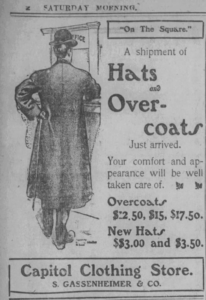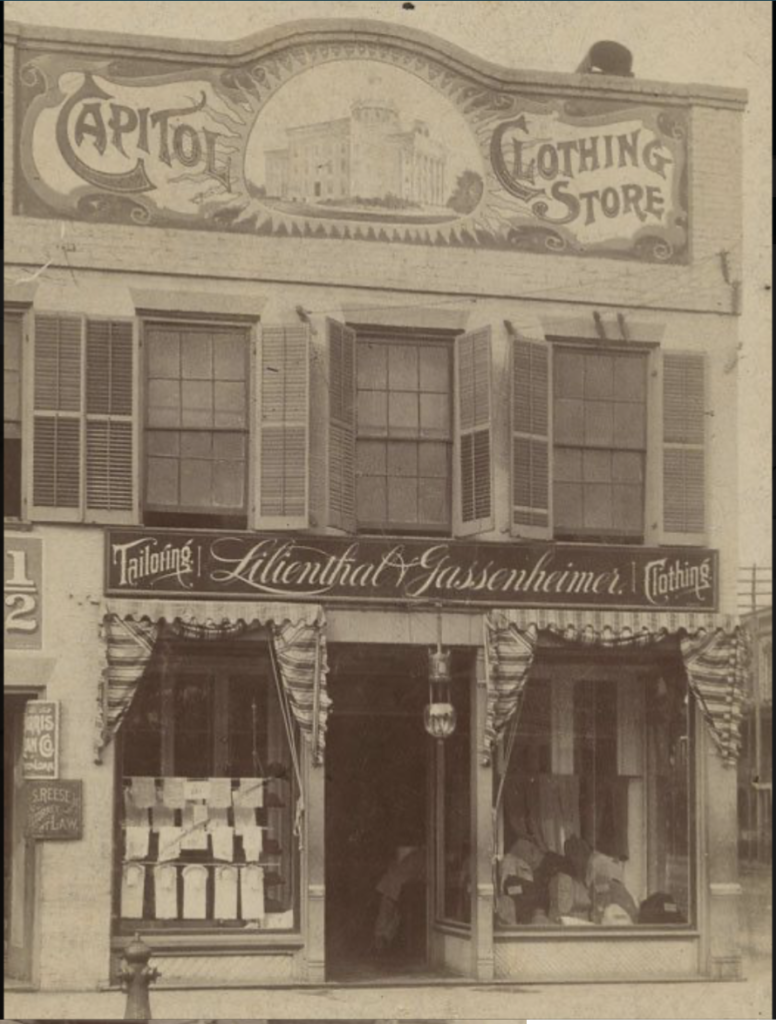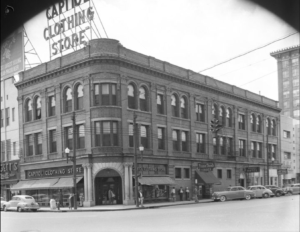Of the five children of Samuel Gassenheimer (1802-1853) who immigrated into the United States between 1856 and 1880, we know most about Simon Gassenheimer, b. 1853 in the village of Bibra. He left Germany in 1868, 16 years old and styling himself a merchant in the ship’s manifest.

In 1944, the Montgomery Advertiser published a glowing review of Simon’s life in America from which we learn highlights: “Coming to Montgomery as a lad to join his brother, who operated an ice house, Mr. Gassenheimer became acquainted with physical labor by driving an ice wagon. […] Believing himself graduated from driving an ice truck, the youthful Gassenheimer went to Opelika and clerked in a dry goods store. But after he had been in this country 10 years, he decided it was time to be looking out for a business of his own. Out of that idea grew the Capitol Clothing Store 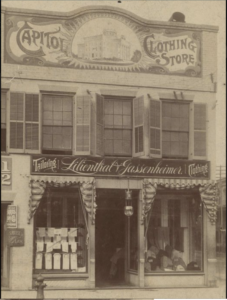 [01 September 1878]. It was established as a partnership, Lilienthal and Gassenheimer, Mr. Lilienthal being the uncle of Sidney Levy and great uncle of Fred Levy, now partners in the firm. […]
[01 September 1878]. It was established as a partnership, Lilienthal and Gassenheimer, Mr. Lilienthal being the uncle of Sidney Levy and great uncle of Fred Levy, now partners in the firm. […]
For more than 30 years Simon was a member of the board of Alabama Reform School. For eight years he was a member of the County Board of Education and for 10 years a director of the Exchange National Bank. He was also a charter member of the Chamber of Commerce and as mentioned before president of the Exchange Hotel for 50 years.
Daily at 11 .m., he [met] a small group of business friends for coffee, a custom started half a century ago. Commenting on Mr. Gassenheimer’s 90th birthday yesterday, one of Montgomery’s most prominent citizens said: ‘There is no more loyal American in Montgomery than Simon Gassenheimer. No words are needed to tell it. His deeds for more than half a century are abundant proof.”
The other major contribution made by Simon Gassenheimer to the city of Montgomery, namely a fireproof hotel. The hotel was built on the site of the earlier Exchange Hotel, and Simon and Maude lived in the hotel.
Source: Scott, John E. Capitol Clothing Store At the Intersection of Court Square and Montgomery Street in Downtown Montgomery, Alabama. Alabama Department of Archives and History.
Story of Life Linked With City’s History
Simon Gassenheimer, regarded as Montgomery’s oldest active businessman and one of its most colourful characters at the time of his death, died at the age of 94 on Saturday, October 1948. Gassenheimer was one of the co-founders of Capitol Clothing Store.
Mr. Gassenheimer’s death occurred in his room at the Exchange Hotel following a critical illness of more than a month. He had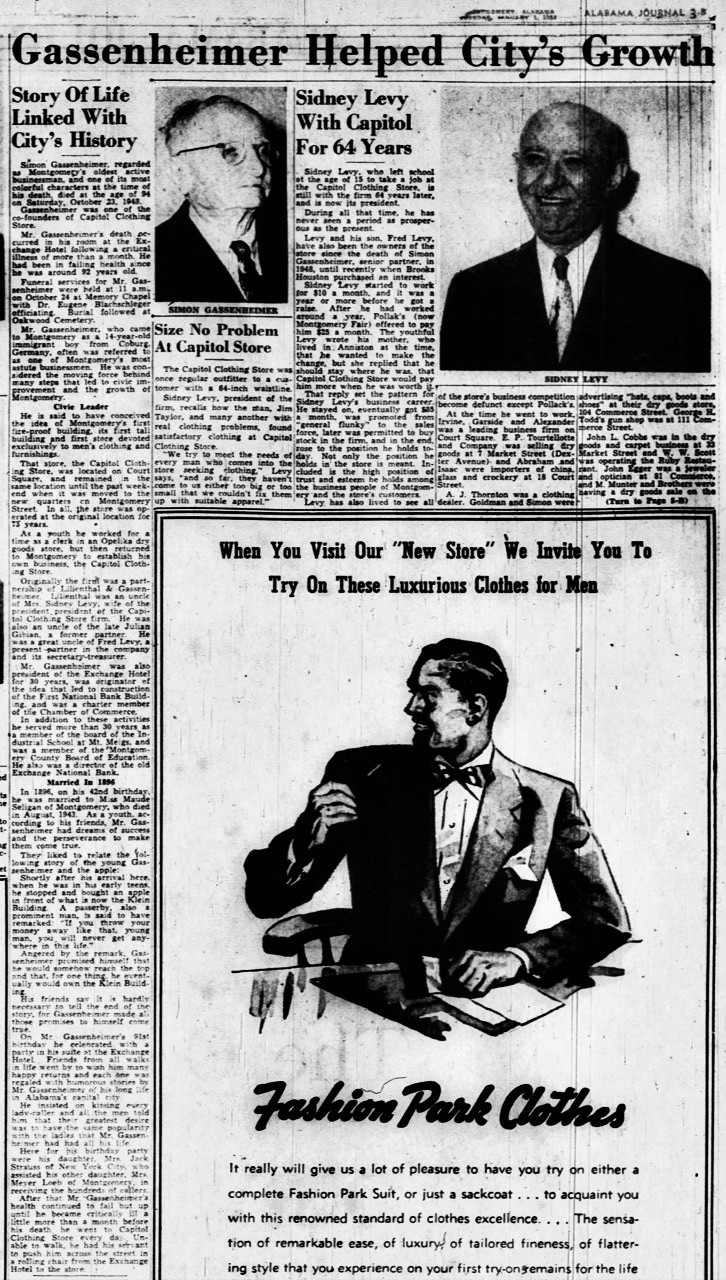 been in failing health since he was around 92 years old
been in failing health since he was around 92 years old
Funeral services for Mr. Gassenheimer were held at 11am on October 24 at Memory Chapel with Dr. Eugene Blarhscieger(sp.?) officiating. Burial followed at Oakwood Cemetery.
Mr. Gassenheimer, who came to Montgomery as a 14-year-old immigrant boy from Coburg, Germany, often referred to as one of Montgomery’s most astute businessmen. He was considered the moving force behind many steps that led to improvement and the growth of Montgomery.
Civic Leader
He is said to have conceived the idea of Montgomery’s first fire-proof building, its first tall building and first store devoted exclusively to men’s clothing and furnishings.
That store, the Capitol Clothing Store, was located on Court Square and remained in the same location until the past weekend when it was moved to the now quarters on Montgomery Street. In all, the store was operated at the original location for 77 years.
As a youth, he worked for a time as a clerk in an Opelika dry goods store, but then returned to Montgomery to establish his own business, the Capitol Clothing Store.
Originally the firm was a partnership of Lilienthal and Gassenheimer. Lilienthal was an uncle of Mrs. Sidney Levy, wife of the president of the Capitol Clothing Store firm. He was also an uncle of the late Julian Gibson, a former partner. He was a great uncle of Fred Levy, a present partner in the company and its secretary-treasurer.
Mr. Gassenheimer was also president of the Exchange Hotel for 30 years, was originator of the idea that led to construction of the First National Bank Building, and was a charter member of the Chamber of Commerce.
In addition to those activities, he served more than 30 years as a member of the board of Industrial School at Mt. Meigs and was a member of the “Montgomery County Board of Education”. He also was a director of the old Exchange National Bank.
Married in 1854
In 1894, on his 42nd birthday, he was married to Miss Maude Seligman of Montgomery, who died in August 1943. As a youth, according to his friends, Mr. Gassenheimer had dreams of success and the perseverance to make them come true.
They liked to related the following story of the young Gassenheimer and the apple:
Shortly after his arrival here, when he was in his early teens, he stopped and bought an apple in front of what is now the Klein Building. A passerby, also a prominent man is said to have remarked: “ If you throw your money away like that, young man, you will never get anywhere in this life”.
Angered by that remark, Gassenheimer promised himself that he would somehow reach the top and that for one thing, he eventually would own the Klein Building.
His friends say it is hardly necessary to tell the end of the story, for Gassenheimer made all those promises to himself come true.
On Mr. Gassenheimer’s 91st birthday, he celebrated with a party in his suite at the Exchange Hotel. Friends from all walks in life went by to wish him many happy returns and each one was regaled with humorous stories by Mr. Gassenheimer of his long life in Alabama’s capital city.
He insisted on kissing every lady caller and all the men told him that their greatest desire was to have the same popularity with the ladies that Mr. Gassenheimer had had all his life.
Here for his birthday party were his daughter Mrs. Jack Strauss of New York City, who assisted his other daughter, Mrs. Meyer Loeb of Montgomery, in receiving the hundreds of callers.
After that Mr. Gassenheimer’s health continued to fall but up until he became critically ill a little more than a month before his death he went to Capital Clothing Store every day. Unable to walk, he had his servant push him across the street in a rolling chair from the Exchange Hotel to the store.
